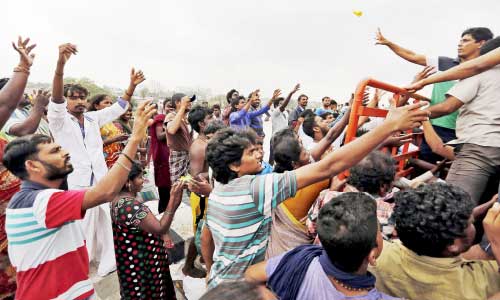Thousands of rescuers raced to evacuate residents from deadly flooding Thursday, as India’s prime minister Narendra Modi headed to the southern state of Tamil Nadu to survey the devastation.
More than 40,000 people have been rescued in recent days after record rains lashed the coastal state, worsening weeks of flooding that has killed 269 people.
But many more are still feared marooned, with much of the state capital Chennai – a city of 4.6 million people – submerged, despite a let-up in the rains overnight.
‘This rainfall has broken a 100-year record and has created an emergency situation in Chennai,’ home minister Rajnath Singh told parliament after days of torrential rain led to a dramatic worsening of the weeks-long crisis.
India’s Air Force evacuated thousands of stranded passengers from Chennai’s international airport, which remained closed for a second day, its runway under water.
Rescuers took advantage of a lull in the rains to pour into the state overnight, joining thousands already there in a race against time to reach those who are stranded.
‘The situation has improved but we are sending more teams so that we can cover as many areas as possible,’ National Disaster Response Force director general OP Singh told reporters.
A naval warship loaded with inflatable boats, medical supplies and diving equipment arrived in Chennai on Thursday, as Modi said he was heading to the city.
The prime minister cited the floods as a consequence of climate change in his weekly radio address on Sunday, a day before meeting other world leaders at a global climate summit in Paris.
He has repeatedly called on developed countries to do more to combat the impact of global warming on the world’s poor, who experts say will be disproportionately affected.
India suffers severe flooding every year during the annual monsoon rains from June to September.
Poor phone networks were hampering rescue efforts, while washed out bridges were slowing delivery of relief supplies, National Disaster Management Authority senior official Anurag Gupta said.
Meanwhile, one of India’s oldest newspapers has not been printed for the first time in 137 years due to rains and floods in the southern city of Chennai (Madras), reports BBConline.
The Hindu, published daily since 1878, did not come out on Wednesday as workers could not access the press.
The paper’s publisher N Murali told BBC Hindi’s Imran Qureshi that it was the first time this had happened.
The rains have suspended flights and trains and hundreds of people are without power.
The Hindu, which is headquartered in Chennai, is also published in 17 other cities.
More than 40,000 people have been rescued in recent days after record rains lashed the coastal state, worsening weeks of flooding that has killed 269 people.
But many more are still feared marooned, with much of the state capital Chennai – a city of 4.6 million people – submerged, despite a let-up in the rains overnight.
‘This rainfall has broken a 100-year record and has created an emergency situation in Chennai,’ home minister Rajnath Singh told parliament after days of torrential rain led to a dramatic worsening of the weeks-long crisis.
India’s Air Force evacuated thousands of stranded passengers from Chennai’s international airport, which remained closed for a second day, its runway under water.
Rescuers took advantage of a lull in the rains to pour into the state overnight, joining thousands already there in a race against time to reach those who are stranded.
‘The situation has improved but we are sending more teams so that we can cover as many areas as possible,’ National Disaster Response Force director general OP Singh told reporters.
A naval warship loaded with inflatable boats, medical supplies and diving equipment arrived in Chennai on Thursday, as Modi said he was heading to the city.
The prime minister cited the floods as a consequence of climate change in his weekly radio address on Sunday, a day before meeting other world leaders at a global climate summit in Paris.
He has repeatedly called on developed countries to do more to combat the impact of global warming on the world’s poor, who experts say will be disproportionately affected.
India suffers severe flooding every year during the annual monsoon rains from June to September.
Poor phone networks were hampering rescue efforts, while washed out bridges were slowing delivery of relief supplies, National Disaster Management Authority senior official Anurag Gupta said.
Meanwhile, one of India’s oldest newspapers has not been printed for the first time in 137 years due to rains and floods in the southern city of Chennai (Madras), reports BBConline.
The Hindu, published daily since 1878, did not come out on Wednesday as workers could not access the press.
The paper’s publisher N Murali told BBC Hindi’s Imran Qureshi that it was the first time this had happened.
The rains have suspended flights and trains and hundreds of people are without power.
The Hindu, which is headquartered in Chennai, is also published in 17 other cities.
Source: New Age









